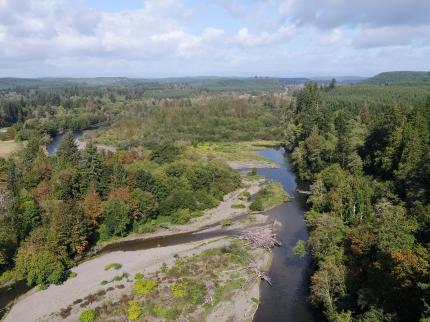ARCHIVED NEWS RELEASE
This document is provided for archival purposes only. Archived documents
do not reflect current WDFW regulations or policy and may contain factual
inaccuracies.
News release Oct. 6, 2022
Contact: Region 6 - Montesano, 360-249-4628
Media contact: Mark Yuasa, 360-902-2262

OLYMPIA – Fishing for salmon and all game fish is closing in most coastal rivers and tributaries beginning Saturday, Oct. 8 until further notice, fishery managers with the Washington Department of Fish and Wildlife (WDFW) announced today.
"Historic low flows this summer are creating conditions that limit fish movements and result in higher-than-expected harvest rates,” said James Losee, WDFW Region 6 fish program manager. “These areas are closing to fishing until river conditions improve and salmon are able to reach the spawning grounds in adequate numbers.”
Around 50 coastal streams from the northern Olympic Peninsula coast to Willapa Bay are closing to salmon fishing and all game fish beginning Saturday, Oct. 8 until further notice. Anglers can find the list of specific rivers by checking the emergency regulations on the WDFW webpage.
Fishery managers plan to reopen when flows increase, or stock assessment information suggests that salmon are successfully migrating upstream.
This conservation measure follows regulation changes in tribal comanagers fisheries. Additionally, the Olympic National Park Service has closed respective fisheries in associated waterbodies.
Fishing is open in Grays Harbor’s East Bay (Marine Area 2-2), Willapa Bay (Marine Area 2-1), and the Chehalis River downstream of Fuller Bridge. The Lower Willapa and Naselle rivers also remain open but for hatchery Chinook and hatchery coho only beginning Saturday, Oct. 8. Look under rules listed in the 2022-23 Washington Sport Fishing Rules pamphlet for additional information. Anglers should continue to check emergency regulations for new and changing seasons or sign up for email notifications at wdfw.wa.gov/about/lists.
The Washington Department of Fish and Wildlife works to preserve, protect, and perpetuate fish, wildlife and ecosystems while providing sustainable fish and wildlife recreational and commercial opportunities.